Carly Richmond
From Gazelle to Pride Leader: The Path to Public Speaking in Tech
#1about 2 minutes
Understanding the fear of public speaking known as glossophobia
The fear of public speaking is a natural survival response, similar to a gazelle facing lions, but in a modern context it manifests as a fear of rejection or embarrassment.
#2about 1 minute
Overcoming past negative speaking experiences and "voluntold" situations
Past negative speaking experiences, often from being "voluntold" to present, can be reframed by taking control and choosing to speak for yourself.
#3about 1 minute
Addressing the lack of formal public speaking education
Traditional education often assesses research content rather than delivery skills like posture and audience engagement, leaving a critical skill gap for professionals.
#4about 1 minute
Realizing it is never too late to start speaking
The belief that you've "missed your shot" is a misconception; public speaking can be started incrementally at any stage of your career.
#5about 3 minutes
The importance of finding and becoming a role model
A lack of relatable role models can be a barrier, but you can seek out diverse speakers or become the role model you wish you had for others.
#6about 5 minutes
Debunking the myth of not being technical enough
Many valuable tech roles and conference topics are not code-centric, and sharing experiences from design, product, or leadership is equally important.
#7about 3 minutes
Start by writing to build confidence and share knowledge
Writing on platforms like company blogs or Dev.to is an effective first step to practice sharing knowledge and build the confidence needed for speaking.
#8about 5 minutes
Leverage workshops, mentors, and communities for support
Accelerate your speaking journey by participating in workshops, finding a mentor, and joining communities like Toastmasters or local meetups for practice and guidance.
#9about 7 minutes
Create a gradual plan for your speaking journey
Approach public speaking like climbing a mountain by starting with short lightning talks and gradually increasing the duration, audience size, and topic complexity.
#10about 4 minutes
How to find and submit to a call for papers (CFP)
Find speaking opportunities through word-of-mouth, meetup.com, or platforms like Sessionize, and understand the key components of a strong CFP submission.
#11about 4 minutes
Structuring your talk proposal for maximum impact
A successful proposal includes a clear title, a concise abstract, a talk outline, and specifies the target audience, format, and level.
#12about 3 minutes
Preparing your slides and practicing your delivery
Create clean, supportive slides with minimal text and practice your talk by recording yourself or presenting to a friend to refine your speed, tone, and style.
#13about 2 minutes
How to prepare for and handle the Q&A session
Prepare for Q&A by anticipating questions and remember that it is perfectly acceptable to say "I don't know" and offer to follow up later.
#14about 3 minutes
The career-changing benefits of public speaking
Public speaking opens doors to new opportunities, helps build a professional portfolio, and can lead to significant career advancements like moving into developer advocacy.
#15about 2 minutes
Understanding the day-to-day role of a developer advocate
A developer advocate's role is varied, involving speaking at conferences, writing blog posts, creating code samples, and engaging with the developer community on forums.
#16about 3 minutes
A personal journey and advice for starting in tech
Inspired by a family role model, the path into tech involved a computer science degree and an internship, highlighting the importance of practical problem-solving.
#17about 3 minutes
Practical tips for launching your tech career now
Start your tech career by building a portfolio of small projects, utilizing online courses, seeking mentors, and applying for jobs even if you don't meet every requirement.
#18about 3 minutes
How to decide on your next career move
Navigate your career path by listening to your gut instincts about opportunities, exploring different roles within your organization, and viewing your career as a climbing frame rather than a ladder.
#19about 1 minute
Navigating a male-dominated industry by finding allies
Overcome the challenges of being in a male-dominated field by actively finding allies and building connections with supportive colleagues to foster an inclusive environment.
#20about 2 minutes
Recommended books and resources for developers
Key learning resources for developers include books like "Software Engineering" by Dave Farley, "The Phoenix Project" for DevOps, and various online learning platforms.
Related jobs
Jobs that call for the skills explored in this talk.
Matching moments
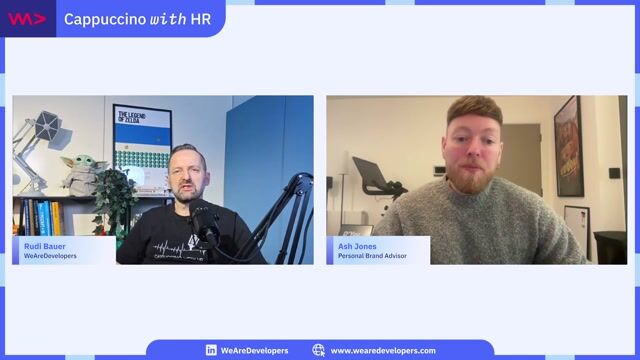
02:39 MIN
Overcoming the initial fear and hesitation of building a brand
Leveraging Leaders’ Voices: The Business Power of Personal Branding

02:48 MIN
Building trust through honest developer advocacy
Devs vs. Marketers, COBOL and Copilot, Make Live Coding Easy and more - The Best of LIVE 2025 - Part 3

03:07 MIN
Final advice for developers adapting to AI
WeAreDevelopers LIVE – AI, Freelancing, Keeping Up with Tech and More
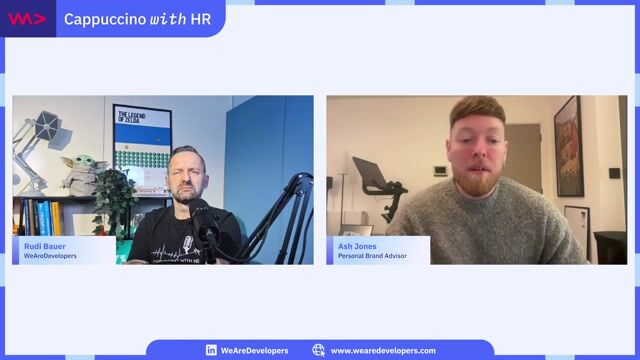
04:57 MIN
Shifting from formal corporate speak to an authentic voice
Leveraging Leaders’ Voices: The Business Power of Personal Branding
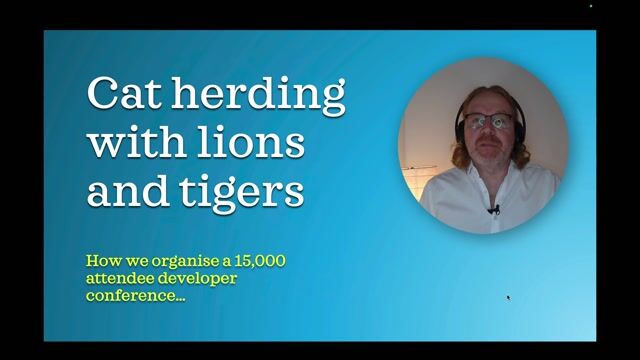
01:32 MIN
Organizing a developer conference for 15,000 attendees
Cat Herding with Lions and Tigers - Christian Heilmann
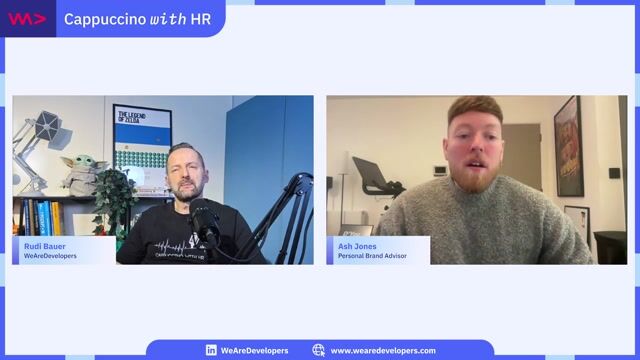
04:18 MIN
Using a leader's personal brand as a business growth strategy
Leveraging Leaders’ Voices: The Business Power of Personal Branding

03:58 MIN
Making accessibility tooling actionable and encouraging
Developer Time Is Valuable - Use the Right Tools - Kilian Valkhof
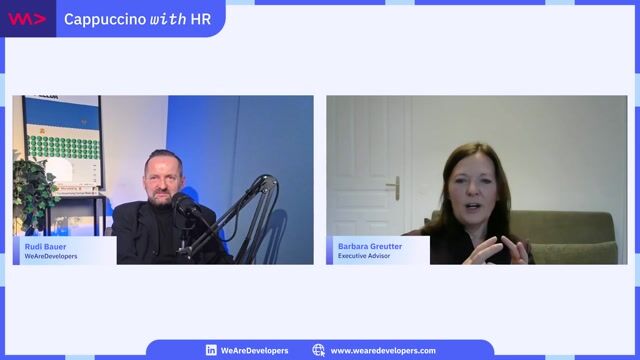
06:01 MIN
Navigating cultural shifts during rapid growth and investment
From Data Keeper to Culture Shaper: The Evolution of HR Across Growth Stages
Featured Partners
Related Videos
 30:38
30:38The power of the community
Anna Leushchenko
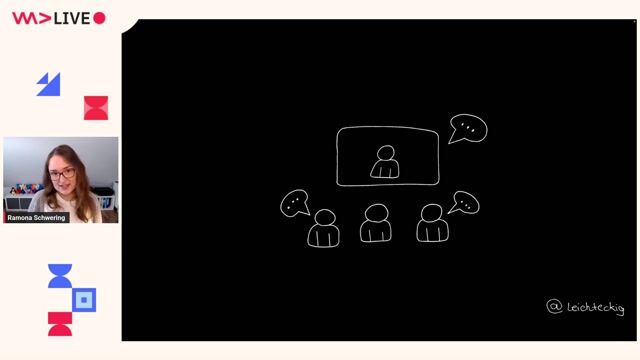 43:17
43:17How to survive conferences as an introvert
Ramona Schwering
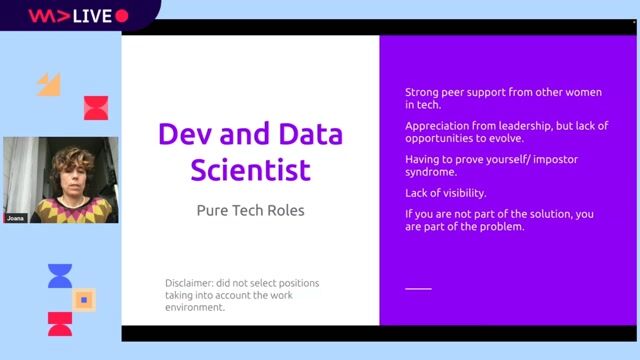 58:44
58:44From developer to instructor and DevRel: navigating roles as as a woman in the tech industry
Joana Simoes
 55:07
55:07What makes a great Software Engineer? Challenging our Assumptions Instead of Talking about Imposter Syndrome
Irina Anastasiu
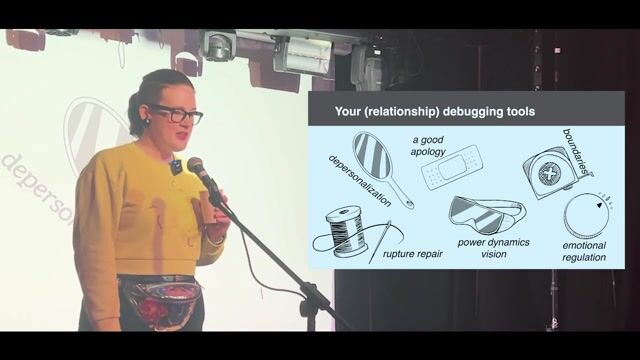 35:23
35:23How to Navigate Professional Relationships in the Tech Industry
Rachel Lee Nabors
 51:47
51:47Strategies for Women to Amplify their Reputation at Workplace
Teena Idnani
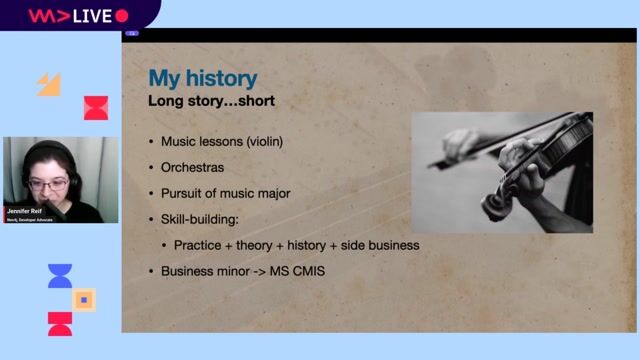 58:30
58:30Fingerboard to Keyboard: Transposing One Profession to Another
Jennifer Reif
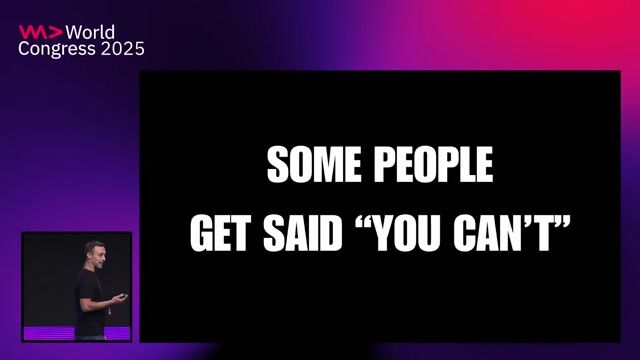 19:50
19:50Finding Your Way in Tech
Francesco Ciulla
Related Articles
View all articles.png?w=240&auto=compress,format)

.webp?w=240&auto=compress,format)

From learning to earning
Jobs that call for the skills explored in this talk.

Code Healers LLC
Hinesville, United States of America
Remote
€30-40K
Intermediate
Senior
.NET
React
JavaScript
+2

Code Healers LLC
Hinesville, United States of America
Remote
€20-30K
Junior
Intermediate
React
JavaScript
TypeScript
+1



awesome.
Sheffield, United Kingdom
Remote
£35-50K
PHP
API
CSS
+8

Macildowie Associates
Loughborough, United Kingdom
£32-40K
CSS
GIT
HTML
Java
+10

Adria Solutions ltd
Charing Cross, United Kingdom
£100K
Senior
React
TypeScript

Passion
Berlin, Germany
Remote
Senior
API
iOS
React
DevOps
+8

Cloudinary
London
Contract
Published: 19 hours ago
Competitive
Charing Cross, United Kingdom
Senior
PHP
Python
Node.js
Project Management